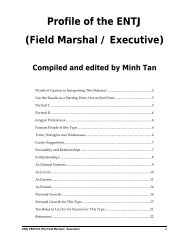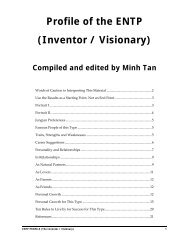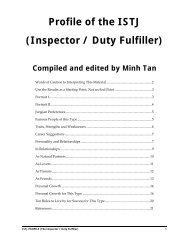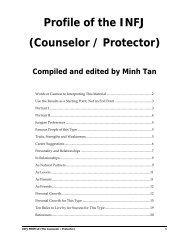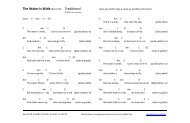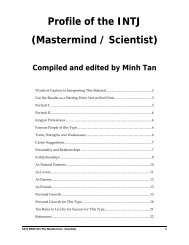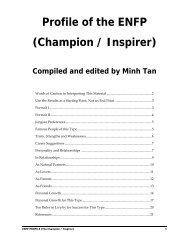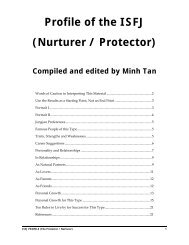Profile of the INTP (Architect / Thinker) - Digital Citizen
Profile of the INTP (Architect / Thinker) - Digital Citizen
Profile of the INTP (Architect / Thinker) - Digital Citizen
Create successful ePaper yourself
Turn your PDF publications into a flip-book with our unique Google optimized e-Paper software.
<strong>Pr<strong>of</strong>ile</strong> <strong>of</strong> <strong>the</strong> <strong>INTP</strong><br />
(<strong>Architect</strong> / <strong>Thinker</strong>)<br />
Compiled and edited by Minh Tan<br />
Words <strong>of</strong> Caution to Interpreting This Material ..................................................... 2<br />
Use <strong>the</strong> Results as a Starting Point, Not an End Point ........................................... 3<br />
Portrait I ........................................................................................................................ 3<br />
Portrait II ....................................................................................................................... 4<br />
Jungian Preferences ..................................................................................................... 5<br />
Famous People <strong>of</strong> this Type ....................................................................................... 5<br />
Traits, Strengths and Weaknesses ............................................................................. 6<br />
Career Suggestions ...................................................................................................... 7<br />
Personality and Relationships ................................................................................... 7<br />
In Relationships ........................................................................................................... 9<br />
As Natural Partners ................................................................................................... 10<br />
As Lovers .................................................................................................................... 11<br />
As Parents ................................................................................................................... 12<br />
As Friends ................................................................................................................... 13<br />
Personal Growth ........................................................................................................ 13<br />
Personal Growth for This Type ............................................................................... 16<br />
Ten Rules to Live by for Success for This Type ..................................................... 22<br />
References ................................................................................................................... 22<br />
<strong>INTP</strong> PROFILE (The <strong>Architect</strong> / <strong>Thinker</strong>) 1
This document contains detailed information about <strong>the</strong> <strong>INTP</strong> Jung personality pr<strong>of</strong>ile. The content<br />
references concepts already mentioned in <strong>the</strong> document called Understanding your Personality<br />
Assessment Results, which can be found on <strong>the</strong> <strong>Digital</strong> <strong>Citizen</strong> website. If you are reading this<br />
and do not understand some <strong>of</strong> <strong>the</strong> content, please refer to <strong>the</strong> referenced document.<br />
This personality pr<strong>of</strong>ile comes with <strong>the</strong> following analysis:<br />
• Portraits (summaries)<br />
• Traits, strengths and weaknesses<br />
• Possible career paths<br />
• Relationships (strengths, weaknesses, lovers, Parents, friends)<br />
• Personal growth (success, happiness, problems, solutions, rules to live by)<br />
The analyses here combine work done by Carl Jung, Katharine Cook Briggs and her daughter,<br />
Isabel Briggs Myers, and David Keirsey. Myers & Briggs built <strong>the</strong>ir work on Jung’s, and Keirsey<br />
expanded and revised some <strong>of</strong> <strong>the</strong>ir work. At times, <strong>the</strong> outcomes conflict in small ways, and <strong>the</strong>y<br />
are noted. However, all <strong>the</strong>ir works are presented for you to embrace whichever appeals to you.<br />
A read <strong>of</strong> <strong>the</strong> Keirsey Temperament documents, found on <strong>the</strong> <strong>Digital</strong> <strong>Citizen</strong> website, is highly<br />
recommended if you want to know more about a pr<strong>of</strong>ile’s tendencies beyond what is here. The<br />
document you want is <strong>the</strong> one with Preference letters found in <strong>the</strong> pr<strong>of</strong>ile you want.<br />
Words <strong>of</strong> Caution in Interpreting This Material<br />
The biggest mistake I <strong>of</strong>ten see with <strong>the</strong> presentation <strong>of</strong> personality assessment results is that<br />
<strong>the</strong>y are spoken <strong>of</strong> in absolute terms, when <strong>the</strong>y should be discussed as majority tendencies.<br />
You got a percentage score with each <strong>of</strong> your Jung type preferences (letter) if you took <strong>the</strong> test<br />
I supplied. That score is an indication <strong>of</strong> how strong you have those tendencies. A 75% score<br />
on Thinking, for example, means you rely on Thinking about 75% <strong>of</strong> <strong>the</strong> time to make decisions<br />
ra<strong>the</strong>r than Feelings. But it also means you use or value Feelings 25% <strong>of</strong> <strong>the</strong> time, ra<strong>the</strong>r than<br />
that you are a Thinking decision-maker all <strong>of</strong> <strong>the</strong> time. You have to keep <strong>the</strong>se percentages<br />
in mind when interpreting this content as it may apply to you or someone else.<br />
Do NOT compare your percentage scores with someone else’s as if <strong>the</strong>y were absolute. That<br />
is, if you had a 75% Thinking score, that does not mean you are more logical than someone<br />
with a 65% Thinking score. The best way I can think to illustrate this is with an analogy. Your<br />
percentage is like how you break up your “pie”, where <strong>the</strong> whole is both Preferences (Thinking<br />
and Feeling here). Someone could have a 55% Thinking score & be more logical in <strong>the</strong>ir decisionmaking<br />
than you. That’s because <strong>the</strong>ir “pie” might be bigger than yours. They may put more<br />
<strong>of</strong>, both, Thinking and Feeling, into <strong>the</strong>ir decision-making, or may be capable <strong>of</strong> more complex<br />
logical decision-making than you. They just don’t rely on Thinking 75% <strong>of</strong> <strong>the</strong> time like you.<br />
That’s all those percentages mean, so keep your % scores only for your own comparison.<br />
While it may more convenient, less convoluted and more convincing to discuss your results in<br />
absolute terms, it is not true. People are complex and <strong>the</strong>re’s no way <strong>of</strong> “dumbing <strong>the</strong>m down”<br />
to understand <strong>the</strong>m. All that does is ei<strong>the</strong>r create misunderstandings or skepticism in <strong>the</strong> results.<br />
Compiled and edited by Minh Tan, digitalcitizen.ca 2
Use <strong>the</strong> Results as a Starting Point, Not an End Point<br />
Jung’s personality type results are generalized, so <strong>the</strong>y can be used as prejudice if you use<br />
<strong>the</strong>m as an end point to judge o<strong>the</strong>rs. This is true if you use <strong>the</strong> results to judge individuals and<br />
condemn <strong>the</strong>m to certain behaviours all <strong>of</strong> <strong>the</strong> time, when you know it is only true more times<br />
than not. It is also unfair to expect all people <strong>of</strong> a certain personality type to all behave <strong>the</strong> same<br />
way given a certain situation, as each has freedom to behave any way in any certain situations.<br />
Humans are not preprogrammed machines. We do not behave with absolute consistency. We just<br />
have tendencies. We are creatures <strong>of</strong> habit, not logic. As a result, use <strong>the</strong> Jung personality type<br />
results as a starting point to understand each o<strong>the</strong>r, not an end point to condemn each o<strong>the</strong>r.<br />
Portrait I – The <strong>Architect</strong><br />
In <strong>the</strong> Keirsey Temperament version <strong>of</strong> <strong>the</strong> Jung personality type system, <strong>the</strong> <strong>INTP</strong> pr<strong>of</strong>ile is<br />
known as <strong>the</strong> <strong>Architect</strong>, though this is meant to be career advice. Here is Keirsey’s description.<br />
<strong>Architect</strong>s need not be thought <strong>of</strong> as only interested in drawing blueprints for buildings or roads<br />
or bridges. They are <strong>the</strong> master designers <strong>of</strong> all kinds <strong>of</strong> <strong>the</strong>oretical systems, including school<br />
curricula, corporate strategies, and new technologies. For <strong>Architect</strong>s, <strong>the</strong> world exists primarily<br />
to be analyzed, understood, explained - and re-designed. External reality in itself is unimportant,<br />
little more than raw material to be organized into structural models. What is important for<br />
<strong>Architect</strong>s is that <strong>the</strong>y grasp fundamental principles and natural laws, and that <strong>the</strong>ir designs<br />
are elegant, that is, efficient and coherent.<br />
<strong>Architect</strong>s are rare – maybe 1% <strong>of</strong> <strong>the</strong> population – and show <strong>the</strong> greatest precision in thought<br />
and speech <strong>of</strong> all <strong>the</strong> types. They tend to see distinctions and inconsistencies instantaneously,<br />
and can detect contradictions no matter when or where <strong>the</strong>y were made. It is difficult for an<br />
<strong>Architect</strong> to listen to nonsense, even in a casual conversation, without pointing out <strong>the</strong> speaker’s<br />
error. And in any serious discussion or debate <strong>Architect</strong>s are devastating, <strong>the</strong>ir skill in framing<br />
arguments giving <strong>the</strong>m an enormous advantage. <strong>Architect</strong>s regard all discussions as a search<br />
for understanding, and believe <strong>the</strong>ir function is to eliminate inconsistencies, which can make<br />
communication with <strong>the</strong>m an uncomfortable experience for many.<br />
Ruthless pragmatists about ideas, and insatiably curious, <strong>Architect</strong>s are driven to find <strong>the</strong> most<br />
efficient means to <strong>the</strong>ir ends, and <strong>the</strong>y will learn in any manner and degree <strong>the</strong>y can. They will<br />
listen to amateurs if <strong>the</strong>ir ideas are useful, and will ignore <strong>the</strong> experts if <strong>the</strong>irs are not. Authority<br />
derived from <strong>of</strong>fice, credential, or celebrity does not impress <strong>the</strong>m. <strong>Architect</strong>s are interested only<br />
in what make sense, and thus only statements that are consistent and coherent carry any weight<br />
with <strong>the</strong>m.<br />
<strong>Architect</strong>s <strong>of</strong>ten seem difficult to know. They are inclined to be shy except with close friends, and<br />
<strong>the</strong>ir reserve is difficult to penetrate. Able to concentrate better than any o<strong>the</strong>r type, <strong>the</strong>y prefer<br />
to work quietly at <strong>the</strong>ir computers or drafting tables, and <strong>of</strong>ten alone. <strong>Architect</strong>s also become<br />
obsessed with analysis, and this can seem to shut o<strong>the</strong>rs out. Once caught up in a thought process,<br />
<strong>INTP</strong> PROFILE (The <strong>Architect</strong> / <strong>Thinker</strong>) 3
<strong>Architect</strong>s close <strong>of</strong>f and persevere until <strong>the</strong>y comprehend <strong>the</strong> issue in all its complexity. <strong>Architect</strong>s<br />
prize intelligence, and with <strong>the</strong>ir grand desire to grasp <strong>the</strong> structure <strong>of</strong> <strong>the</strong> universe, <strong>the</strong>y can<br />
seem arrogant & may show impatience with o<strong>the</strong>rs who have less ability, or who are less driven.<br />
Portrait II – The <strong>Thinker</strong><br />
The <strong>INTP</strong> pr<strong>of</strong>ile is also <strong>of</strong>ten called <strong>the</strong> <strong>Thinker</strong>. This is how <strong>the</strong> <strong>INTP</strong> pr<strong>of</strong>ile is also <strong>of</strong>ten<br />
summarized.<br />
As an <strong>INTP</strong>, your primary mode <strong>of</strong> living is focused internally, where you deal with things<br />
rationally and logically. Your secondary mode is external, where you take things in primarily<br />
via your iNtuition.<br />
<strong>INTP</strong>s live in <strong>the</strong> world <strong>of</strong> <strong>the</strong>oretical possibilities. They see everything in terms <strong>of</strong> how it could<br />
be improved, or what it could be turned into. They live primarily inside <strong>the</strong>ir own minds, having<br />
<strong>the</strong> ability to analyze difficult problems, identify patterns, and come up with logical explanations.<br />
They seek clarity in everything & are <strong>the</strong>refore driven to build knowledge. They are <strong>the</strong> “absentminded<br />
pr<strong>of</strong>essors”, who highly value intelligence and <strong>the</strong> ability to apply logic to <strong>the</strong>ories to find<br />
solutions. They typically are so strongly driven to turn problems into logical explanations, that<br />
<strong>the</strong>y live much <strong>of</strong> <strong>the</strong>ir lives within <strong>the</strong>ir own heads, and may not place as much importance or<br />
value on <strong>the</strong> external world. Their natural drive to turn <strong>the</strong>ories into concrete understanding may<br />
turn into a feeling <strong>of</strong> personal responsibility to solve <strong>the</strong>oretical problems, and help society move<br />
towards a higher understanding.<br />
<strong>INTP</strong>s value knowledge above all else. Their minds are constantly working to generate new<br />
<strong>the</strong>ories, or to prove or disprove existing <strong>the</strong>ories. They approach problems and <strong>the</strong>ories with<br />
enthusiasm and skepticism, ignoring existing rules and opinions and defining <strong>the</strong>ir own approach<br />
to <strong>the</strong> resolution. They seek patterns and logical explanations for anything that interests <strong>the</strong>m.<br />
They’re usually extremely bright, and able to be objectively critical in <strong>the</strong>ir analysis. They love<br />
new ideas, and become very excited over abstractions and <strong>the</strong>ories. They love to discuss <strong>the</strong>se<br />
concepts with o<strong>the</strong>rs. They may seem “dreamy” and distant to o<strong>the</strong>rs, because <strong>the</strong>y spend a<br />
lot <strong>of</strong> time inside <strong>the</strong>ir minds musing over <strong>the</strong>ories. They hate to work on routine things – <strong>the</strong>y<br />
would much prefer to build complex <strong>the</strong>oretical solutions, and leave <strong>the</strong> implementation <strong>of</strong> <strong>the</strong><br />
system to o<strong>the</strong>rs. They are intensely interested in <strong>the</strong>ory, and will put forth tremendous amounts<br />
<strong>of</strong> time and energy into finding a solution to a problem with has piqued <strong>the</strong>ir interest.<br />
<strong>INTP</strong>s do not like to lead or control people. They’re very tolerant and flexible in most situations,<br />
unless one <strong>of</strong> <strong>the</strong>ir firmly held beliefs has been violated or challenged, in which case <strong>the</strong>y may<br />
take a very rigid stance. The <strong>INTP</strong> is likely to be very shy when it comes to meeting new people.<br />
On <strong>the</strong> o<strong>the</strong>r hand, <strong>the</strong> <strong>INTP</strong> is very self-confident and gregarious around people <strong>the</strong>y know well,<br />
or when discussing <strong>the</strong>ories which <strong>the</strong>y fully understand.<br />
The <strong>INTP</strong> has no understanding or value for decisions made on <strong>the</strong> basis <strong>of</strong> personal subjectivity<br />
or feelings. They strive constantly to achieve logical conclusions to problems & don’t understand<br />
<strong>the</strong> importance or relevance <strong>of</strong> applying subjective emotional considerations to decisions. For<br />
Compiled and edited by Minh Tan, digitalcitizen.ca 4
this reason, <strong>INTP</strong>s are usually not in-tune with how people are feeling, and are not naturally wellequipped<br />
to meet <strong>the</strong> emotional needs <strong>of</strong> o<strong>the</strong>rs.<br />
The <strong>INTP</strong> may have a problem with self-aggrandizement and social rebellion, which will interfere<br />
with <strong>the</strong>ir creative potential. Since <strong>the</strong>ir Feeling side is <strong>the</strong>ir least developed trait, <strong>the</strong> <strong>INTP</strong> may<br />
have difficulty giving <strong>the</strong> warmth & support sometimes necessary in intimate relationships. If <strong>the</strong><br />
<strong>INTP</strong> doesn’t realize <strong>the</strong> value <strong>of</strong> attending to o<strong>the</strong>r people’s feelings, s/he may become overly<br />
critical and sarcastic with o<strong>the</strong>rs. If <strong>the</strong> <strong>INTP</strong> is not able to find a place for <strong>the</strong>mselves which<br />
supports <strong>the</strong> use <strong>of</strong> <strong>the</strong>ir strongest abilities, <strong>the</strong>y may become generally negative and cynical.<br />
If <strong>the</strong> <strong>INTP</strong> has not developed <strong>the</strong>ir Sensing side sufficiently, <strong>the</strong>y may become unaware <strong>of</strong> <strong>the</strong>ir<br />
environment, and exhibit weakness in performing maintenance-type tasks, such as bill-paying<br />
and dressing appropriately.<br />
For <strong>the</strong> <strong>INTP</strong>, it is extremely important that ideas and facts are expressed correctly and succinctly.<br />
They are likely to express <strong>the</strong>mselves in what <strong>the</strong>y believe to be absolute truths. Sometimes, <strong>the</strong>ir<br />
well thought-out understanding <strong>of</strong> an idea is not easily understandable by o<strong>the</strong>rs, but <strong>the</strong> <strong>INTP</strong><br />
is not naturally likely to tailor <strong>the</strong> truth so as to explain it in an understandable way to o<strong>the</strong>rs.<br />
The <strong>INTP</strong> may be prone to abandoning a project once <strong>the</strong>y have figured it out, moving on to <strong>the</strong><br />
next thing. It’s important that <strong>the</strong> <strong>INTP</strong> place importance on expressing <strong>the</strong>ir developed <strong>the</strong>ories<br />
in understandable ways. In <strong>the</strong> end, an amazing discovery means nothing if you are <strong>the</strong> only<br />
person who understands it.<br />
The <strong>INTP</strong> is usually very independent, unconventional, and original. They are not likely to place<br />
much value on traditional goals such as popularity and security. They usually have complex<br />
characters, and may tend to be restless and temperamental. They are strongly ingenious, and<br />
have unconventional thought patterns which allows <strong>the</strong>m to analyze ideas in new ways.<br />
Consequently, a lot <strong>of</strong> scientific breakthroughs in <strong>the</strong> world have been made by <strong>the</strong> <strong>INTP</strong>.<br />
The <strong>INTP</strong> is at his best when he can work on his <strong>the</strong>ories independently. When given an<br />
environment which supports his creative genius and possible eccentricity, <strong>the</strong> <strong>INTP</strong> can<br />
accomplish truly remarkable things. These are <strong>the</strong> pioneers <strong>of</strong> new thoughts in our society.<br />
Jungian Preference Ordering<br />
• Dominant: Introverted Thinking<br />
• Auxiliary: Extraverted iNtuition<br />
• Tertiary: Introverted Sensing<br />
• Inferior: Extraverted Feeling<br />
Famous <strong>Architect</strong>s<br />
• Albert Einstein<br />
• Thomas Jefferson<br />
• Marie Curie<br />
• Charles Darwin<br />
• David Keirsey<br />
• George Soros<br />
• Gregory Peck<br />
• Harper Lee<br />
• Robert Rosen<br />
<strong>INTP</strong> PROFILE (The <strong>Architect</strong> / <strong>Thinker</strong>) 5
<strong>INTP</strong> Traits, Strengths and Weaknesses<br />
Whe<strong>the</strong>r you’re a young adult trying to find your place in <strong>the</strong> world, or a not-so-young adult<br />
trying to find out if you’re moving along <strong>the</strong> right path, it’s important to understand yourself<br />
and <strong>the</strong> personality traits which will impact your likeliness to succeed or fail at various careers.<br />
It’s equally important to understand what is really important to you. When armed with an<br />
understanding <strong>of</strong> your strengths and weaknesses, and an awareness <strong>of</strong> what you truly value,<br />
you are in an excellent position to pick a career which you will find rewarding.<br />
<strong>INTP</strong>s generally have <strong>the</strong> following traits:<br />
• Love <strong>the</strong>ory and abstract ideas<br />
• Truth Seekers - <strong>the</strong>y want to understand things by analyzing underlying principles<br />
and structures<br />
• Value knowledge and competence above all else<br />
• Have very high standards for performance, which <strong>the</strong>y apply to <strong>the</strong>mselves<br />
• Independent and original, possibly eccentric<br />
• Work best alone, and value autonomy<br />
• Have no desire to lead or follow<br />
• Dislike mundane detail<br />
• Not particularly interested in <strong>the</strong> practical application <strong>of</strong> <strong>the</strong>ir work<br />
• Creative and insightful<br />
• Future-oriented<br />
• Usually brilliant and ingenious<br />
• Trust <strong>the</strong>ir own insights and opinions above o<strong>the</strong>rs<br />
• Live primarily inside <strong>the</strong>ir own minds, and may appear to be detached and uninvolved<br />
with o<strong>the</strong>r people<br />
<strong>INTP</strong>s have a special gift with generating and analyzing <strong>the</strong>ories and possibilities to prove or<br />
disprove <strong>the</strong>m. They have a great deal <strong>of</strong> insight and are creative thinkers, which allows <strong>the</strong>m<br />
to quickly grasp complex abstract thoughts. They also have exceptional logical and rational<br />
reasoning skills, which allows <strong>the</strong>m to thoroughly analyze <strong>the</strong>ories to discover <strong>the</strong> Truth about<br />
<strong>the</strong>m. Since <strong>the</strong> <strong>INTP</strong> is driven to seek clarity in <strong>the</strong> world, we have a happy match <strong>of</strong> desire<br />
and ability in this personality type. <strong>INTP</strong>s will be happiest in careers which allow <strong>the</strong>m a great<br />
deal <strong>of</strong> autonomy in which <strong>the</strong>y can work primarily alone on developing and analyzing complex<br />
<strong>the</strong>ories and abstractions, with <strong>the</strong> goal <strong>of</strong> <strong>the</strong>ir work being <strong>the</strong> discovery <strong>of</strong> a truth, ra<strong>the</strong>r than<br />
<strong>the</strong> discovery <strong>of</strong> a practical application.<br />
Compiled and edited by Minh Tan, digitalcitizen.ca 6
Career Suggestions for <strong>the</strong> <strong>INTP</strong><br />
Research has shown that many <strong>of</strong> <strong>the</strong> different Personality Types tend to have distinct preferences<br />
in <strong>the</strong>ir choice <strong>of</strong> careers. We have incorporated observations <strong>of</strong> each type’s character traits which<br />
affect career choice along with some suggestions for possible directions. We have also included<br />
lists <strong>of</strong> actual careers which <strong>the</strong> various types have chosen in <strong>the</strong>ir lives.<br />
This material is provided for your reference, and is intended to be an informational guide. It does<br />
not comprise a complete analysis <strong>of</strong> ideal careers for individuals & does not guarantee success or<br />
failure at any occupation. As we know, individuals vary greatly. However, we highly encourage<br />
personal self-knowledge & research in your quest to live up to your fullest, and for this reason we<br />
provide you with this information. For a complete & personal evaluation <strong>of</strong> career possibilities,<br />
you should speak with a career guidance counselor.<br />
• Scientists – especially Physics, Chemistry<br />
• Photographers<br />
• Strategic Planners<br />
• Ma<strong>the</strong>maticians<br />
• University Pr<strong>of</strong>essors<br />
• Computer Programmers, Systems Analysts, Computer Animation and Computer Specialists<br />
• Technical Writers<br />
• Engineers<br />
• Lawyers / Attorneys<br />
• Judges<br />
• Forensic Research<br />
• Forestry and Park Rangers<br />
Personality and Relationships<br />
“And above all, have fervent love for one ano<strong>the</strong>r: for love shall cover <strong>the</strong> multitude <strong>of</strong> sins.”<br />
– Peter 4:8<br />
Most <strong>of</strong> us are probably allured by <strong>the</strong> attractive notion that effortless relationships exist.<br />
Whe<strong>the</strong>r it be happily-ever-after marriages, or friendships which last forever, or parent/child<br />
bonds which supersede <strong>the</strong> need to understand each o<strong>the</strong>r, we’d all like to believe that our most<br />
intimate relationships are unconditional, and strong enough to withstand whatever may come.<br />
However, at some point in our lives most <strong>of</strong> us need to face <strong>the</strong> fact that relationships require<br />
effort to keep <strong>the</strong>m strong and positive, and that even wonderful, strong relationships can be<br />
destroyed by neglect.<br />
Whe<strong>the</strong>r you’re looking to improve a love relationship, familial relationships, friendships, or<br />
employer/employee relationships, understanding your own personality type and <strong>the</strong> personality<br />
type <strong>of</strong> <strong>the</strong> o<strong>the</strong>r person involved in <strong>the</strong> relationship will bring a new dynamic to <strong>the</strong> situation,<br />
which will allow better understanding and communication. Although <strong>the</strong> different types <strong>of</strong><br />
relationships have very different characteristics and specific needs, <strong>the</strong>re are two basic areas<br />
<strong>INTP</strong> PROFILE (The <strong>Architect</strong> / <strong>Thinker</strong>) 7
which seem to be critical in all relationships: Expectations and Communication. What do we expect<br />
from ourselves and <strong>the</strong> o<strong>the</strong>r person involved in <strong>the</strong> relationship? How do we communicate <strong>the</strong>se<br />
expectations, and our feelings and opinions to <strong>the</strong> person in <strong>the</strong> relationship? How does our<br />
personality type affect our expectations and methods <strong>of</strong> communication? Does our personality<br />
type affect who we are romantically attracted to? How does it affect who our friends are, and who<br />
we work with best? These are <strong>the</strong> questions which we address following.<br />
**Disclaimer**<br />
Please note that we are not prescribing an absolute solution to your relationship problems,<br />
nor are we stating that <strong>the</strong>re’s any guarantee <strong>of</strong> improved odds with particular type pairings.<br />
Statistics show that individuals who are most happy within <strong>the</strong>ir marriages are those who<br />
have <strong>the</strong> highest levels <strong>of</strong> inner peace and those who have <strong>the</strong> most optimistic outlook on life<br />
in general. We do not address people’s emotional standing here when discussing relationship<br />
issues, which is ano<strong>the</strong>r important aspect <strong>of</strong> relationship dynamics.<br />
Opposites Attract<br />
That old concept and expression “opposites attract” has been batted around for centuries. And<br />
in fact, it’s very true when it comes to love relationships. Through our research, we have noted<br />
that people are usually attracted to <strong>the</strong>ir opposite on <strong>the</strong> Extraversion/Introversion and Judging/<br />
Perceiving scales. We are naturally attracted to individuals who are different from ourselves –<br />
and <strong>the</strong>refore somewhat exciting. But it’s not just <strong>the</strong> exciting differences which attract us to our<br />
opposites, it is also a natural quest for completion. We naturally are drawn towards individuals<br />
who have strengths which we are missing. When two opposites function as a couple, <strong>the</strong>y become<br />
a more well-rounded, functioning unit. There is also <strong>the</strong> <strong>the</strong>ory that our natural attraction to our<br />
opposites is a subconscious way <strong>of</strong> forcing us to deal with <strong>the</strong> weaker aspects <strong>of</strong> our own nature.<br />
While we are highly attracted to our opposites, two opposites involved in an intimate relationship<br />
have significant issues and communication barriers to overcome. So in a sense, our attraction to<br />
<strong>the</strong> opposite personality can be seen as our subconscious minds driving us towards becoming<br />
a more complete individual, by causing us to face <strong>the</strong> areas in life which are most difficult to us.<br />
The same cannot be said for o<strong>the</strong>r kinds <strong>of</strong> relationships. When it comes to work colleagues, or<br />
friends, we are not especially interested in dealing with people who are very unlike ourselves.<br />
We are most comfortable with those who have similar interests and perspectives, and we do not<br />
show a lot <strong>of</strong> motivation or patience for dealing with our opposites.<br />
Birds <strong>of</strong> a Fea<strong>the</strong>r Flock Toge<strong>the</strong>r<br />
Although we are attracted to people who are very different from us in <strong>the</strong> way we deal with <strong>the</strong><br />
world, we are most attracted to o<strong>the</strong>rs who have a similar focus in <strong>the</strong>ir lives. Couples who have<br />
<strong>the</strong> same dominant function in <strong>the</strong>ir personalities seems to have <strong>the</strong> longest and happiest relationships.<br />
So, for example, an individual whose dominant function is Introverted Sensing (ISTJ or<br />
ISFJ) seems to be naturally drawn towards partners with a dominant function <strong>of</strong> Extraverted<br />
Sensing (ESTP or ESFP).<br />
Compiled and edited by Minh Tan, digitalcitizen.ca 8
We have also noticed that Sensors seem to communicate best with o<strong>the</strong>r Sensors, and that<br />
iNtuitives seem to communicate best with o<strong>the</strong>r iNtuitives. There seems to be a more equal<br />
partnership formed with people who communicate on <strong>the</strong> same level, although <strong>the</strong>re are many<br />
successful relationships between Sensors and iNtuitives. Two individuals <strong>of</strong> any type who are<br />
well-developed & balanced can communicate effectively and make a relationship work, but most<br />
will communicate best with people who share <strong>the</strong>ir same information ga<strong>the</strong>ring preference.<br />
With that in mind, it shouldn’t come as any surprise to learn that research regarding Personality<br />
Type and Relationships shows a definite pattern which indicates that successful mates <strong>of</strong>ten share<br />
<strong>the</strong> same dominant function, and <strong>the</strong> same letter preference (“S” or “N”) for <strong>the</strong>ir information<br />
ga<strong>the</strong>ring function. Of course, that does not mean that people with different preferences cannot<br />
have a happy, successful marriage, it simply indicates that people frequently settle down with<br />
individuals who are on <strong>the</strong>ir same “wave-length”.<br />
<strong>INTP</strong>s in Relationships<br />
<strong>INTP</strong>s live rich worlds inside <strong>the</strong>ir minds, which are full <strong>of</strong> imagination and excitement.<br />
Consequently, <strong>the</strong>y sometimes find <strong>the</strong> external world pales in comparison. This may result<br />
in a lack <strong>of</strong> motivation to form and maintain relationships. <strong>INTP</strong>s are not likely to have a very<br />
large circle <strong>of</strong> significant relationships in <strong>the</strong>ir lives. They’re much more likely to have a few<br />
very close relationships, which <strong>the</strong>y hold in great esteem and with great affection. Since <strong>the</strong><br />
<strong>INTP</strong>’s primary focus and attention is turned inwards, aimed towards seeking clarity from<br />
abstract ideas, <strong>the</strong>y are not naturally tuned into o<strong>the</strong>rs’ emotional feelings and needs. They<br />
tend to be difficult to get to know well, and hold back parts <strong>of</strong> <strong>the</strong>mselves until <strong>the</strong> o<strong>the</strong>r<br />
person has proven <strong>the</strong>mselves “worthy” <strong>of</strong> hearing <strong>the</strong> <strong>INTP</strong>’s thoughts. Holding Knowledge<br />
and Brain Power above all else in importance, <strong>the</strong> <strong>INTP</strong> will choose to be around people who<br />
<strong>the</strong>y consider to be intelligent. Once <strong>the</strong> <strong>INTP</strong> has committed <strong>the</strong>mself to a relationship, <strong>the</strong>y<br />
tend to be very faithful and loyal, and form affectionate attachments which are pure and<br />
straight-forward. The <strong>INTP</strong> has no interest or understanding <strong>of</strong> game-playing with regards<br />
to relationships. However, if something happens which <strong>the</strong> <strong>INTP</strong> considers irreconcilable,<br />
<strong>the</strong>y will leave <strong>the</strong> relationship and not look back.<br />
Relationship Strengths<br />
• They feel love and affection for those close to <strong>the</strong>m which is almost childlike in its purity<br />
• Generally laid-back and easy-going, willing to defer to <strong>the</strong>ir mates<br />
• Approach things which interest <strong>the</strong>m very enthusiastically<br />
• Richly imaginative and creative<br />
• Do not feel personally threatened by conflict or criticism<br />
• Usually are not demanding, with simple daily needs<br />
Relationship Weaknesses<br />
• Not naturally in tune with o<strong>the</strong>rs’ feelings; slow to respond to emotional needs<br />
• Not naturally good at expressing <strong>the</strong>ir own feelings and emotions<br />
<strong>INTP</strong> PROFILE (The <strong>Architect</strong> / <strong>Thinker</strong>) 9
• Tend to be suspicious and distrusting <strong>of</strong> o<strong>the</strong>rs<br />
• Not usually good at practical matters, such as money management, unless <strong>the</strong>ir work<br />
involves <strong>the</strong>se concerns<br />
• They have difficulty leaving bad relationships<br />
• Tend to “blow <strong>of</strong>f” conflict situations by ignoring <strong>the</strong>m, or else <strong>the</strong>y “blow up” in heated<br />
anger<br />
<strong>INTP</strong> Natural Partners (in love and in life)<br />
Before you read this section, I would like to put in a word <strong>of</strong> caution not to take this section<br />
too seriously. Take it for what it’s worth, a statistical likelihood.<br />
All that means is that given some large sampling <strong>of</strong> pairs <strong>of</strong> various personality types, <strong>the</strong> natural<br />
partners are <strong>the</strong> ones which get along best most frequently. However, for any given pair, too<br />
many factors in life influence how a relationship develops for naturally matching personalities<br />
to be <strong>the</strong> determining factor. It’s a possible edge, enough to use as <strong>the</strong> core for love partner<br />
matching on love matching sites like chemistry.com or e-harmony, but not enough to be used<br />
along as those sites also take into account o<strong>the</strong>r life factors like personal interests, jobs and such.<br />
Natural partners listed here are for life, in general, although some <strong>of</strong> <strong>the</strong> text is written for love<br />
partners ra<strong>the</strong>r than just two people’s ability to get along toge<strong>the</strong>r well.<br />
Although two well-developed individuals <strong>of</strong> any type can enjoy a healthy relationship, <strong>the</strong><br />
<strong>INTP</strong>’s natural partner is <strong>the</strong> ENTJ, or <strong>the</strong> ESTJ. See <strong>the</strong>ir pr<strong>of</strong>iles on <strong>the</strong> <strong>Digital</strong> <strong>Citizen</strong> website.<br />
The <strong>INTP</strong>’s dominant function <strong>of</strong> Introverted Thinking is best matched with a partner whose<br />
personality is dominated by Extraverted Thinking. The <strong>INTP</strong>/ENTJ match is ideal, because<br />
<strong>the</strong>se types shared iNtuition as a common way <strong>of</strong> perceiving <strong>the</strong> world.<br />
You may be interested in understanding how we came to <strong>the</strong> conclusion that certain types are<br />
ideal for each o<strong>the</strong>r. Our type pairing is a result <strong>of</strong> combining observation, research, and understanding<br />
<strong>of</strong> Jungian psychological type. Observation and research <strong>of</strong> married couples shows<br />
that <strong>the</strong>re is a definite trend in types that are attracted to each o<strong>the</strong>r, and in type combinations<br />
that have <strong>the</strong> longest lasting relationships. Our understanding <strong>of</strong> psychological type helps to<br />
see that <strong>the</strong>se types typically have <strong>the</strong> same dominant function, but with a different attitude.<br />
In Jungian terms, “functions” refer to <strong>the</strong> four core traits: iNtuition (N), Sensing (S), Feeling (F),<br />
and Thinking (T). The term “attitude” refers to <strong>the</strong> direction <strong>of</strong> <strong>the</strong> function, i.e. Introverted (I)<br />
or Extraverted (E).<br />
So, for example, a person with a personality type <strong>of</strong> ISFP has a dominant function <strong>of</strong> Introverted<br />
Feeling. More specifically, Feeling in <strong>the</strong> dominant function, and its attitude (or direction) is<br />
Introverted. A person with this personality type is likely to be most attracted to, and fit best<br />
with, a person that has Extraverted Feeling dominating <strong>the</strong>ir personality. Extraverted Feeling<br />
dominates <strong>the</strong> personality types ESFJ and ENFJ. We <strong>the</strong>refore determine that <strong>the</strong> ISFP’s natural<br />
partner is <strong>the</strong> ESFJ or <strong>the</strong> ENFJ.<br />
Compiled and edited by Minh Tan, digitalcitizen.ca 10
Our natural attraction to people who share our dominant function, but who use it in a different<br />
direction works very well for us. We not only flip-flop <strong>the</strong> Introverted or Extraverted trait, but we<br />
also flip-flop <strong>the</strong> Judging or Perceiving trait. In this way, <strong>the</strong> partner that we choose for ourselves<br />
will have a very different approach to dealing with <strong>the</strong> world. If we are laid-back and indecisive,<br />
our partner will be structured and decisive. If we are reserved, our partner will be outgoing. For<br />
all <strong>of</strong> our apparent differences, we will share a common vision <strong>of</strong> what’s truly important in life.<br />
For people whose personality types are dominated by Decision Making functions, (i.e. Thinking<br />
or Feeling), <strong>the</strong>ir ideal partners will include both Sensing and iNtuitive types. Many people have<br />
problems communicating effectively with people who do not share <strong>the</strong>ir same preference for<br />
Information Ga<strong>the</strong>ring. So, if you have a very strong preference for Sensing or iNtuition, you will<br />
need to give <strong>the</strong> personality type with <strong>the</strong> same preference a higher value as a likely natural<br />
partner. For example, an ISFP who strongly prefers Sensing will work best with an ESFJ, ra<strong>the</strong>r<br />
than an ENFJ.<br />
Although we believe firmly that this model works very well to help in finding and maintaining<br />
healthy relationships, it is important to remember that it’s just a tool. We <strong>of</strong>fer guidelines to help<br />
you understand <strong>the</strong> kinds <strong>of</strong> things that you value in a relationship, ra<strong>the</strong>r than guidelines that<br />
you need to follow strictly. Two well-developed individuals <strong>of</strong> any type can make a relationship<br />
work, and work is a key concept here! There is no such thing as an effortless relationship. Don’t<br />
use this model as an excuse to dump your relationship.<br />
<strong>INTP</strong>s as Lovers<br />
“To love means to open ourselves to <strong>the</strong> negative as well as <strong>the</strong> positive – to grief, sorrow,<br />
and disappointment as well as to joy, fulfillment, and an intensity <strong>of</strong> consciousness<br />
we did not know was possible before.”<br />
– Rollo May<br />
<strong>INTP</strong>s approach <strong>the</strong>ir intimate relationships quite seriously - as <strong>the</strong>y approach most things in<br />
life. They take <strong>the</strong>ir vows and commitments seriously, and are usually faithful and loyal. They<br />
are usually pretty easy to live with and be around, because <strong>the</strong>y have simple daily needs and<br />
are not overly demanding <strong>of</strong> <strong>the</strong>ir partners in almost any respect. While <strong>the</strong> <strong>INTP</strong>’s internal life<br />
is highly <strong>the</strong>oretical and complex, <strong>the</strong>ir external life in comparison is usually quite simple. They<br />
like to keep <strong>the</strong> complexities <strong>of</strong> <strong>the</strong>ir external world to a minimum, so that <strong>the</strong>y can focus <strong>the</strong>ir<br />
brain power on working through <strong>the</strong>ir <strong>the</strong>ories internally. This makes <strong>the</strong>m very straight-forward,<br />
honest lovers, with a love that is quite pure in its simple, uncomplicated nature.<br />
Although <strong>the</strong>y choose to keep things straight-forward in <strong>the</strong>ir relationships, this does not mean<br />
that <strong>the</strong> <strong>INTP</strong> is lacking in depth <strong>of</strong> feeling or passion. The <strong>INTP</strong> is very creative person, who<br />
has vivid imaginations. They can be very excitable and passionate about <strong>the</strong>ir love relationships.<br />
Sometimes, <strong>the</strong>y have a problem reconciling <strong>the</strong> exciting visions <strong>of</strong> <strong>the</strong>ir internal worlds with<br />
<strong>the</strong> actuality <strong>of</strong> <strong>the</strong>ir external circumstances.<br />
<strong>INTP</strong> PROFILE (The <strong>Architect</strong> / <strong>Thinker</strong>) 11
The largest area <strong>of</strong> potential strife in an <strong>INTP</strong>’s intimate relationship is <strong>the</strong>ir slowness in understanding<br />
and meeting <strong>the</strong>ir partner’s emotional needs. The <strong>INTP</strong> may be extremely dedicated to<br />
<strong>the</strong> relationship, and deeply in love with <strong>the</strong>ir partner, but may have no understanding <strong>of</strong> <strong>the</strong>ir<br />
mate’s emotional life, and may not express <strong>the</strong>ir own feelings <strong>of</strong>ten or well. When <strong>the</strong> <strong>INTP</strong> does<br />
express <strong>the</strong>mselves, it’s likely to be in <strong>the</strong>ir own way at <strong>the</strong>ir own time, ra<strong>the</strong>r than in response<br />
to <strong>the</strong>ir partner’s needs. If this is an issue which has caused serious problems in a relationship,<br />
<strong>the</strong> <strong>INTP</strong> should work on becoming more aware <strong>of</strong> <strong>the</strong>ir partner’s feelings, and <strong>the</strong>ir partner<br />
should work on not requiring explicit positive affirmation to feel loved by <strong>the</strong> <strong>INTP</strong>.<br />
<strong>INTP</strong>s do not like to deal with messy complications, such as interpersonal conflict, so <strong>the</strong>y may<br />
fall into <strong>the</strong> habit <strong>of</strong> ignoring conflict when it occurs. If <strong>the</strong>y feel <strong>the</strong>y must face <strong>the</strong> conflict, <strong>the</strong>y<br />
are likely to approach it from an analytical perspective. This may aggravate <strong>the</strong> conflict situation,<br />
if <strong>the</strong>ir partner simply wants to feel that <strong>the</strong>y are supported and loved. Most people (especially<br />
those with <strong>the</strong> Feeling preference) simply want to be encouraged, affirmed and supported<br />
when <strong>the</strong>y are upset. The <strong>INTP</strong> should practice meeting <strong>the</strong>se needs in conflict situations.<br />
Sexual Tendencies<br />
Sexually, <strong>the</strong> <strong>INTP</strong> usually approaches intimacy with enthusiasm and excitement. Some <strong>INTP</strong>s<br />
play down entirely <strong>the</strong> need for sexual relations in <strong>the</strong>ir lives, but most use <strong>the</strong>ir rich imaginations<br />
& child-like enthusiasm to make <strong>the</strong> most <strong>of</strong> <strong>the</strong> moment. The <strong>INTP</strong> will usually be experiencing<br />
<strong>the</strong> moment with vivid intensity inside <strong>the</strong>ir own minds, though this may or may not be apparent<br />
to <strong>the</strong>ir partner.<br />
<strong>INTP</strong>s as Parents<br />
“You are <strong>the</strong> bows from which your children as living arrows are sent forth...<br />
Let your bending in <strong>the</strong> archer’s hand be for gladness;<br />
For even as He loves <strong>the</strong> arrow that flies,<br />
so He loves also <strong>the</strong> bow that is stable.”<br />
– Kahlil Gibran<br />
<strong>INTP</strong>s love and respect Knowledge, and want to pass <strong>the</strong>ir jewels <strong>of</strong> thought down to <strong>the</strong>ir<br />
children. Their greatest goal and satisfaction as a parent is seeing <strong>the</strong>ir children grow into<br />
independent, rational adults.<br />
<strong>INTP</strong> parents are likely to encourage <strong>the</strong>ir children to grow as individuals, ra<strong>the</strong>r than attempt<br />
to fit <strong>the</strong>m into a preconceived mold. They will stress autonomy through <strong>the</strong> children’s growth.<br />
They’re likely to respect <strong>the</strong>ir children’s opinions and wishes, and allow <strong>the</strong>ir children to have<br />
a voice and presence in <strong>the</strong> family.<br />
The <strong>INTP</strong> parents are likely to be pretty laid-back and flexible with <strong>the</strong>ir children, sometimes to<br />
<strong>the</strong> point <strong>of</strong> being relatively “hands-<strong>of</strong>f” with regards to <strong>the</strong> day-to-day issues. They’re likely to<br />
count on <strong>the</strong>ir spouse for providing structure and schedules. Since <strong>the</strong> <strong>INTP</strong> does not live in an<br />
Compiled and edited by Minh Tan, digitalcitizen.ca 12
overly structured or organized manner, <strong>the</strong>y’re not likely to expect or create this environment<br />
for <strong>the</strong>ir children. If <strong>the</strong>ir spouse is not someone with <strong>the</strong> “J” preference, <strong>the</strong>ir children may<br />
suffer from a lack <strong>of</strong> boundaries. This is something <strong>the</strong> <strong>INTP</strong> should pay special attention to.<br />
Growing children don’t know Right from Wrong, and so benefit from having <strong>the</strong>ir parents<br />
define <strong>the</strong>se boundaries for <strong>the</strong>m.<br />
In spite <strong>of</strong> <strong>the</strong>ir relatively unstructured approach to parenting, <strong>INTP</strong>s take <strong>the</strong>ir role as parent<br />
very seriously, and are likely to put forth much effort into doing what <strong>the</strong>y feel will be most<br />
effective in helping <strong>the</strong>ir children grow into independent, wise adults. <strong>INTP</strong>s enjoy parenting,<br />
and get a lot <strong>of</strong> fun out <strong>of</strong> <strong>the</strong>ir children. They’re also likely to be very proud and loyal parents.<br />
<strong>INTP</strong>s may have a problem meeting <strong>the</strong> emotional needs <strong>of</strong> <strong>the</strong>ir children. Although <strong>the</strong>y<br />
generally are deeply caring and supportive individuals, <strong>the</strong> <strong>INTP</strong> does not always pick up<br />
on emotional clues. A troubled child <strong>of</strong> an unaware <strong>INTP</strong> parent may have to result to drastic<br />
“attention-getting” tactics to get <strong>the</strong>ir parent to understand <strong>the</strong>ir emotional difficulties. If you<br />
find yourself in this situation, you may find that expressing some <strong>of</strong> your own emotions will<br />
do wonders for your child, yourself, and your relationship. Although it may not be possible<br />
for you to suddenly be “tuned in” on what your children are feeling, at least you can let <strong>the</strong>m<br />
know that you care.<br />
Children <strong>of</strong> <strong>INTP</strong> parents generally remember <strong>the</strong>m respectfully and affectionately as loyal,<br />
fair, and tolerant parents, who care for <strong>the</strong>m a great deal, although <strong>the</strong>y don’t <strong>of</strong>ten show it.<br />
<strong>INTP</strong>s as Friends<br />
<strong>INTP</strong>s are likely to have friends who share <strong>the</strong>ir interests and pursuits. Since <strong>the</strong> <strong>INTP</strong> loves<br />
<strong>the</strong>ories, ideas, and concepts, <strong>the</strong>y are not likely to have much patience or understanding<br />
for Sensing people, who are not usually comfortable with abstract conceptualizing.<br />
Personal Growth<br />
Perhaps <strong>the</strong> most important realization that an individual can make in <strong>the</strong>ir quest for personal<br />
growth is that <strong>the</strong>re is no single formula that defines <strong>the</strong> path to personal success. We all have<br />
different goals and priorities, which means that different activities and attitudes will make us feel<br />
good about ourselves. We also have different natural strengths and weaknesses that are a part<br />
<strong>of</strong> our inherent personality type. How <strong>the</strong>n, as individuals, can we feel successful in our lives?<br />
Understand What’s Important to You<br />
Each personality type has a different idea <strong>of</strong> what it means to be successful. Self-knowledge is one<br />
common goal that will help everyone achieve personal success. So many people are hung up on<br />
somebody else’s idea <strong>of</strong> what it means to be successful, and <strong>the</strong>y are unaware <strong>of</strong> what is truly<br />
important to <strong>the</strong>m. This is completely normal. We all have important role-models and influencers<br />
<strong>INTP</strong> PROFILE (The <strong>Architect</strong> / <strong>Thinker</strong>) 13
in our lives who may have basic values quite different from our own. If so, it’s important to<br />
recognize that <strong>the</strong> discrepancy between what we have been taught is truly important and what<br />
we personally believe to be truly important is due to a difference in perspective. If we spend<br />
our time and effort trying to meet somebody else’s idea <strong>of</strong> success, and ignore or belittle any<br />
conflicting messages from our own psyche, <strong>the</strong>n we will find ourselves exhausted and unhappy.<br />
Realizing what is truly important to us is a major step towards achieving personal success.<br />
Recognize Your Weaknesses Without Hiding Behind Them<br />
While improving our self-knowledge and realizing our true goals can be very liberating,<br />
we should not discard <strong>the</strong> rules <strong>of</strong> <strong>the</strong> society in which we live. We must recognize that o<strong>the</strong>r<br />
people’s value systems are no less important than our own. And we must recognize and accept<br />
that we live in a society in which certain personality types and behaviors are more suited towards<br />
particular tasks. This is <strong>the</strong> second key that will open <strong>the</strong> door towards personal growth.<br />
For example, <strong>the</strong>re are situations in which it is more appropriate & effective to show compassion<br />
and caring (Feeling), ra<strong>the</strong>r than impersonal logic (Thinking). Likewise, <strong>the</strong>re are situations that<br />
call for using impersonal logic to make a decision, in which <strong>the</strong> more subjective viewpoint <strong>of</strong> <strong>the</strong><br />
Feeling function is inappropriate and ineffective. Persons with a preference for Feeling will have a<br />
natural advantage over <strong>Thinker</strong>s in situations that require compassion and awareness <strong>of</strong> o<strong>the</strong>r’s<br />
emotions. Conversely, persons with a preference for Thinking will have a natural advantage<br />
over Feelers in situations that require <strong>the</strong> ability to make a decision based on impersonal data.<br />
As we learn about our personality type and <strong>the</strong> types <strong>of</strong> o<strong>the</strong>rs, we are empowered with an<br />
understanding <strong>of</strong> why people react differently in different situations. When put into <strong>the</strong> context<br />
<strong>of</strong> Psychological Type, we can better accept and understand people’s behaviors that are different<br />
from ours. These insights are extremely useful and powerful to us as individuals. However, if<br />
we are concerned with growing as individuals, we must take care not to use personality type as<br />
an excuse for our inappropriate behavior. While it’s powerful and useful to notice that ano<strong>the</strong>r<br />
person’s inappropriate behavior may be due to <strong>the</strong>ir personality type, we cannot use <strong>the</strong> same<br />
reasoning on ourselves. We should recognize that our personality type has weaknesses, but<br />
we must use that knowledge to conquer those weaknesses ra<strong>the</strong>r than to excuse poor behavior.<br />
We cannot be responsible for o<strong>the</strong>r people’s behavior, but we can control our own.<br />
Accordingly, if we notice that someone seems to be unable to make an impersonal decision that<br />
is isolated from human perspective, we should say to ourselves, “Ah ha, here is a Feeler. This<br />
person does not use Thinking well, and that is why <strong>the</strong>y’re behaving this way.” Yet when we as<br />
Feelers are presented with a situation that requires an impersonal approach, we should NOT say<br />
to ourselves “I am a Feeler, and can’t be expected to make decisions based purely on impersonal<br />
facts & logic.” This kind <strong>of</strong> rationalization for behavior is certainly an easy way out <strong>of</strong> a situation,<br />
but it enforces <strong>the</strong> weakness, making it weaker and weaker still.<br />
Strive for Balance<br />
Most <strong>of</strong> <strong>the</strong> weaknesses associated with any given personality type are a result <strong>of</strong> that type’s<br />
dominant function overtaking <strong>the</strong> personality to <strong>the</strong> extent that <strong>the</strong> o<strong>the</strong>r functions become<br />
Compiled and edited by Minh Tan, digitalcitizen.ca 14
slaves to <strong>the</strong> dominant function. Although it is natural for every personality to be ruled by<br />
its dominant function, it becomes a problem when <strong>the</strong> supporting functions are not allowed<br />
to develop fully on <strong>the</strong>ir own because <strong>the</strong>y are too busy “serving <strong>the</strong> master”. In such cases,<br />
a personality can become quite imbalanced.<br />
A situation in which <strong>the</strong> dominant function <strong>of</strong> a personality completely overshadows <strong>the</strong> o<strong>the</strong>r<br />
personality functions is analogous to a kingdom ruled by an overbearing king who requires<br />
absolute servitude. Imagine such a king sitting down to dinner in his castle. He keeps all <strong>of</strong> his<br />
servants running about to bring him dinner, and requires that <strong>the</strong>y serve him fully (disregarding<br />
<strong>the</strong>ir own needs) until he is completed sated. His Foreign Minister, expected at an important<br />
affair at a neighboring kingdom, finds himself pouring ale. His Minister <strong>of</strong> Domestic Affairs,<br />
ra<strong>the</strong>r than addressing <strong>the</strong> issue <strong>of</strong> a failing economy, slices roast turkey. His staff grabs food<br />
for <strong>the</strong>mselves here and <strong>the</strong>re, but never get what <strong>the</strong>y really need or want, and are consequently<br />
unsatisfied, malnourished, and underdeveloped. The issues that <strong>the</strong> staff should be taking care<br />
<strong>of</strong> are left undone, because <strong>the</strong>y never finish <strong>the</strong>ir primary task <strong>of</strong> serving <strong>the</strong> king. The king’s<br />
immediate needs are being met, and so he is tolerably happy, but he is an ineffective king. As far<br />
as he knows, everything and everybody exists simply to serve him. He has no concept <strong>of</strong> Success<br />
beyond his daily needs. Since he cannot see beyond his own needs, <strong>the</strong> entire kingdom suffers.<br />
Likewise, a personality that has developed with a goal <strong>of</strong> serving <strong>the</strong> dominant function above<br />
all o<strong>the</strong>r considerations <strong>of</strong>ten results in a person who is imbalanced. In severe cases, weaknesses<br />
associated with <strong>the</strong> given type are <strong>of</strong>ten quite apparent to o<strong>the</strong>rs and overshadow <strong>the</strong> individual’s<br />
natural strengths. Such a drastic imbalance is not common, and may be <strong>the</strong> result <strong>of</strong> continuous<br />
& extreme stress. Most people will experience times in <strong>the</strong>ir lives during which <strong>the</strong>y are stressed<br />
to <strong>the</strong> point <strong>of</strong> serious imbalance. People who experience this constantly have issues that need<br />
to be dealt with, and should seek help.<br />
Much more commonly, we see individuals who exhibit both <strong>the</strong> strengths and weaknesses <strong>of</strong><br />
<strong>the</strong>ir type. It is natural and healthy that each personality type is ruled by a dominant function,<br />
and that <strong>the</strong> o<strong>the</strong>r functions support <strong>the</strong> ruling function. We don’t seek to change anyone’s<br />
natural self, or to achieve a perfect balance amongst a personality’s functions. By definition, a<br />
kingdom needs a king in order to exist, and a personality needs a dominant function. However,<br />
a kingdom with a well-developed and effective king (<strong>the</strong> dominant function), who has welltrained<br />
and educated advisors (<strong>the</strong> supporting functions), will thrive more than <strong>the</strong> kingdom<br />
ruled by a neglectful king who is supported by inexperienced advisors.<br />
As we can see, Balance and Success are relative terms. They have different meaning for<br />
each personality type, but one statement is true for all types: Balance is <strong>the</strong> key to Success.<br />
Opening <strong>the</strong> Door<br />
So how do we go about realizing what’s truly important to us? How do we recognize our<br />
weaknesses, and learn not to hide behind <strong>the</strong>m? How do we become balanced? How do<br />
we open that magical door that will show us <strong>the</strong> way to personal growth and success?<br />
There is no quickie scheme that will make you a successful person. Psychological Type is<br />
a powerful aid in our quest for excellence, but it is not <strong>the</strong> actual solution. It is a model that<br />
<strong>INTP</strong> PROFILE (The <strong>Architect</strong> / <strong>Thinker</strong>) 15
will help you to expand your understanding <strong>of</strong> human nature. An improved understanding<br />
<strong>of</strong> yourself and o<strong>the</strong>rs will help you to find, follow or expand your path. An awareness and<br />
acceptance <strong>of</strong> <strong>the</strong> fact that one personality function may be more effective than ano<strong>the</strong>r function<br />
in a given situation will help you to understand <strong>the</strong> relevance <strong>of</strong> personal growth to your life.<br />
Carl Jung identified a process <strong>of</strong> personal growth that he called individuation, which is essentially<br />
<strong>the</strong> conscious realization <strong>of</strong> your true self, beyond <strong>the</strong> Ego that is presented by your conscious<br />
self. Our efforts to help people develop <strong>the</strong>mselves is essentially <strong>the</strong> effort to help <strong>the</strong>m to realize<br />
that <strong>the</strong>ir personal perspectives and conscious ideas are only a small part <strong>of</strong> who <strong>the</strong>y are, and<br />
that <strong>the</strong> more <strong>the</strong>y try to develop and defend this superficial “self”, <strong>the</strong> fur<strong>the</strong>r <strong>the</strong>y get away<br />
from <strong>the</strong>ir true Self. This realization helps a psyche in many concrete ways, and is also a positive<br />
step towards promoting a psyche that is open to <strong>the</strong> process <strong>of</strong> individuation. For <strong>the</strong> purposes <strong>of</strong><br />
making this realization accessible to <strong>the</strong> general public, our writings are mostly void <strong>of</strong> complex<br />
<strong>the</strong>oretical discussion.<br />
<strong>INTP</strong> Personal Growth<br />
What does Success Mean to You?<br />
People with <strong>the</strong> <strong>INTP</strong> personality type are global thinkers. They see everything as one giant<br />
Entity that is connected, and seek knowledge about that Entity. They constantly seek <strong>the</strong> Truth,<br />
and have ultimate respect for <strong>the</strong> Truth. It is not easy for <strong>the</strong> <strong>INTP</strong> to reach a conclusion about<br />
<strong>the</strong> Truth. Their auxiliary function <strong>of</strong> Extraverted iNtuition allows <strong>the</strong>m to absorb <strong>the</strong> many<br />
complexities in our world, and <strong>the</strong>y are driven to consider each <strong>of</strong> <strong>the</strong>se complexities before<br />
reaching a conclusion. Once <strong>the</strong>y have reached a conclusion, or discovered a Truth, <strong>the</strong>y are very<br />
particular about <strong>the</strong> way that Truth is expressed and understood. They want to know that <strong>the</strong><br />
principles <strong>of</strong> <strong>the</strong>ir understanding have been understood correctly, and demand absolute precision<br />
& correctness from o<strong>the</strong>rs when describing <strong>the</strong>se principles. They also apply <strong>the</strong>se standards<br />
to <strong>the</strong>mselves when communicating <strong>the</strong>ir knowledge. If <strong>the</strong>y take <strong>the</strong> time to develop <strong>the</strong>ir<br />
communication so it meets <strong>the</strong>ir own approval, <strong>the</strong>y can be extremely good educational writers.<br />
In addition to <strong>the</strong>ir immense respect for metaphysical principles, facts, and Truths, <strong>the</strong> <strong>INTP</strong><br />
highly respects logic and <strong>the</strong> way that <strong>the</strong> mind works logically when seeking to master some<br />
subject or situation. They get great pleasure from engaging in logical acts that require quick,<br />
spatial reasoning, such as mind games, or time-based IQ tests. The <strong>INTP</strong> shines in this realm.<br />
Introverted Thinking is an “action-based” kind <strong>of</strong> logic. In <strong>the</strong> case <strong>of</strong> <strong>the</strong> <strong>INTP</strong> (as opposed<br />
to ISTP), <strong>the</strong> action may or may not occur in a physical place outside <strong>of</strong> <strong>the</strong> <strong>INTP</strong>’s mind, but<br />
it is experienced with lightning speed in <strong>the</strong> current moment, based on current objects, using<br />
subjectively understood “actions” <strong>of</strong> reason.<br />
The <strong>INTP</strong> is happiest in situations in which <strong>the</strong>y can use logic regularly in an effort to uncover<br />
Truths about <strong>the</strong> Entity. Their ability to be effective in <strong>the</strong>se efforts, as well as <strong>the</strong>ir ability to deal<br />
with people and feel comfortable with <strong>the</strong>ir place in <strong>the</strong> world, will be in large part dependent<br />
on <strong>the</strong> development <strong>of</strong> Extraverted iNtuition. Although <strong>the</strong>y have more simple needs from<br />
interpersonal relationships than most o<strong>the</strong>r types have, it’s very important that <strong>the</strong>y keep up<br />
Compiled and edited by Minh Tan, digitalcitizen.ca 16
<strong>the</strong>ir extraverted relationships, ra<strong>the</strong>r than going it alone. <strong>INTP</strong>s who isolate <strong>the</strong>mselves rarely<br />
feel happy or successful. The <strong>INTP</strong>’s feeling <strong>of</strong> success depends upon <strong>the</strong>ir opportunities<br />
to exercise <strong>the</strong>ir active mind, <strong>the</strong>ir opportunities to seek and find Truth, and <strong>the</strong> condition<br />
<strong>of</strong> <strong>the</strong>ir relationships and extraverted life.<br />
Allowing Your Strengths to Flourish<br />
As an <strong>INTP</strong>, you have gifts that are specific to your personality type that aren’t natural strengths<br />
for o<strong>the</strong>r types. By recognizing your special gifts and encouraging <strong>the</strong>ir growth and development,<br />
you will more readily see your place in <strong>the</strong> world, and be more content with your role.<br />
Nearly all <strong>INTP</strong>s will recognize <strong>the</strong> following characteristics in <strong>the</strong>mselves. They should embrace<br />
and nourish <strong>the</strong>se strengths:<br />
• They have a natural ability to focus and get “into <strong>the</strong> zone” when working on a problem.<br />
They can absorb <strong>the</strong>ir minds completely with an issue, and work it through with amazing<br />
speed and accuracy. This ability makes <strong>the</strong>m outstanding trouble-shooters. Since <strong>the</strong>ir<br />
logical abilities are dependent on <strong>the</strong>ir experiences, <strong>the</strong>ir abilities will increase with time.<br />
<strong>INTP</strong>s with experience are <strong>of</strong>ten seen as <strong>the</strong> “gurus” <strong>of</strong> <strong>the</strong>ir pr<strong>of</strong>essions.<br />
• Their respect for precision in communication lends <strong>the</strong>m <strong>the</strong> ability to accurately<br />
convey <strong>the</strong>ir ideas and discoveries in full.<br />
• They are usually quite intelligent and can grasp difficult concepts.<br />
• They are <strong>of</strong>ten jovial and good-natured, with a good sense <strong>of</strong> humor.<br />
• They are not overly demanding in personal relationships, and have simple daily needs.<br />
They are <strong>of</strong>ten easy and enjoyable to live with.<br />
<strong>INTP</strong>s who have developed <strong>the</strong>ir Extraverted iNtuition to <strong>the</strong> extent that <strong>the</strong>y regularly take in<br />
information in an objective fashion, ra<strong>the</strong>r than strictly to feed Introverted Thinking, will enjoy<br />
<strong>the</strong>se very special gifts:<br />
• They may be exceptionally intelligent, and make ground-breaking discoveries.<br />
• With a well-developed understanding <strong>of</strong> <strong>the</strong>ir environment and <strong>the</strong> ability to act<br />
very quickly, <strong>the</strong>y may good athletes.<br />
• They’re typically able to communicate <strong>the</strong>ir ideas more concisely than <strong>the</strong> average<br />
<strong>INTP</strong> without sacrificing accuracy.<br />
• They understand <strong>the</strong> benefits <strong>of</strong> close relationships, and understand how to support<br />
and enhance <strong>the</strong>se relationships.<br />
• They see <strong>the</strong> value <strong>of</strong> principles that are not strictly logical<br />
• They have attractive and compelling personalities, and are well-liked and accepted<br />
by most people.<br />
<strong>INTP</strong> PROFILE (The <strong>Architect</strong> / <strong>Thinker</strong>) 17
Potential Problem Areas<br />
With any gift <strong>of</strong> strength, <strong>the</strong>re is an associated weakness. Without “bad”, <strong>the</strong>re would be no<br />
“good”. Without “difficult”, <strong>the</strong>re would be no “easy”. We value our strengths, but we <strong>of</strong>ten<br />
curse and ignore our weaknesses. To grow as a person and get what we want out <strong>of</strong> life, we<br />
must not only capitalize upon our strengths, but also face our weaknesses and deal with <strong>the</strong>m.<br />
That means taking a hard look at our personality type’s potential problem areas.<br />
Most <strong>of</strong> <strong>the</strong> weaker characteristics that are found in <strong>INTP</strong>s are due to <strong>the</strong>ir dominant function <strong>of</strong><br />
Introverted Thinking overtaking <strong>the</strong> personality to <strong>the</strong> point that all <strong>of</strong> <strong>the</strong> o<strong>the</strong>r functions exist<br />
merely to serve <strong>the</strong> purposes <strong>of</strong> Introverted Thinking. In such cases, an <strong>INTP</strong> may show some<br />
or all <strong>of</strong> <strong>the</strong> following weaknesses in varying degrees:<br />
• The <strong>INTP</strong> gets “stuck in a rut” and only does those things that are known and comfortable<br />
to <strong>the</strong> <strong>INTP</strong>.<br />
• The <strong>INTP</strong> resists and rejects anything that doesn’t support <strong>the</strong>ir own experiential<br />
understanding <strong>of</strong> <strong>the</strong> world. If <strong>the</strong>y perceive that something is not logical, <strong>the</strong>y<br />
reject it as unimportant.<br />
• They reject people who think or live differently than <strong>the</strong>mselves.<br />
• They may be extremely caustic and insulting to o<strong>the</strong>rs.<br />
• They may become isolated from society.<br />
• They may become overly paranoid about social organizations and institutions trying<br />
to control <strong>the</strong>m.<br />
• They may unknowingly or uncaringly hurt people’s feelings.<br />
• They may be completely unaware <strong>of</strong> how to express <strong>the</strong>ir inner world to o<strong>the</strong>rs<br />
in a meaningful way.<br />
• They may be completely unaware <strong>of</strong> <strong>the</strong> type <strong>of</strong> communication that is <strong>of</strong>ten desirable<br />
and (to some degree) expected in an intimate relationship. If <strong>the</strong>y are aware <strong>of</strong> <strong>the</strong> kinds<br />
<strong>of</strong> things that are appropriate to say and do to foster emotional bonding, <strong>the</strong>y may be<br />
unable to appreciate <strong>the</strong> value <strong>of</strong> such actions. They may feel too vulnerable to express<br />
<strong>the</strong>mselves in this fashion, and so reject <strong>the</strong> entire idea.<br />
• If pushed beyond <strong>the</strong>ir comfort level to form commitments or emotional bonds,<br />
<strong>the</strong>y may reject a relationship entirely.<br />
• Under stress, <strong>the</strong>y may show intense emotions that seem disproportionate to <strong>the</strong> situation.<br />
• They may not recognize basic social principles, such as appropriate dress and general<br />
behavior.<br />
Explanation <strong>of</strong> Problems<br />
Nearly all <strong>of</strong> <strong>the</strong> problematic characteristics described above can be attributed in various degrees<br />
to <strong>the</strong> common <strong>INTP</strong> problem <strong>of</strong> only taking in information that relates to or supports <strong>the</strong>ir own<br />
Compiled and edited by Minh Tan, digitalcitizen.ca 18
life experience. The <strong>INTP</strong> is driven to work with and understand his or her world by applying<br />
logic (an immediate, spatial, “fuzzy” logic) to <strong>the</strong> current situation. Although <strong>the</strong>y generally seek<br />
to uncover truths, <strong>the</strong>y don’t always have a goal in mind to achieve from <strong>the</strong> logical process.<br />
The act or process <strong>of</strong> using logic is rewarding to <strong>the</strong> <strong>INTP</strong>. In <strong>the</strong>ir zeal for <strong>the</strong> satisfaction that<br />
comes from mastering a problem or situation, <strong>INTP</strong>s <strong>of</strong>ten selectively choose to put <strong>the</strong>mselves<br />
in situations in which <strong>the</strong>y have <strong>the</strong> opportunity to exercise <strong>the</strong>se skills. That’s certainly not a<br />
problem. Most personality types choose to do <strong>the</strong> things that <strong>the</strong>y’re best at most <strong>of</strong>ten. Such<br />
is <strong>the</strong> nature <strong>of</strong> capitalizing upon our strengths. The problem rears its ugly head when <strong>the</strong> goal<br />
<strong>of</strong> <strong>the</strong> <strong>INTP</strong> becomes to achieve <strong>the</strong>ir personal satisfaction at all costs.<br />
It is healthy to choose your paths and goals in life so that <strong>the</strong>y coincide with what you find<br />
rewarding, and what you’re really good at. However, it sometimes happens that we take this<br />
approach a bit too far and sacrifice an accurate and objective understanding <strong>of</strong> <strong>the</strong> world for<br />
a more narrow vision that is easier and comfortable for us to deal with. The <strong>INTP</strong> affects this<br />
problem when <strong>the</strong>y stop taking in information in a truly objective sense, and instead only<br />
take in information that can be worked through logically.<br />
The dominant function <strong>of</strong> <strong>the</strong> <strong>INTP</strong> is Introverted Thinking. This function is supported closely<br />
& importantly by <strong>the</strong> auxiliary function <strong>of</strong> Extraverted iNtuition. Extraverted iNtuition perceives<br />
<strong>the</strong> world and sends information into <strong>the</strong> psyche, where it is processed by Introverted Thinking.<br />
An <strong>INTP</strong> who uses <strong>the</strong>ir Extraverted iNtuition function in a diminished way is one who perceives<br />
information for <strong>the</strong> sole purpose <strong>of</strong> feeding Introverted Thinking, ra<strong>the</strong>r than taking everything in<br />
objectively. They are less concerned with understanding something for <strong>the</strong> sake <strong>of</strong> understanding<br />
than <strong>the</strong>y are with feeding a piece <strong>of</strong> data into <strong>the</strong>ir Thinking function. Information that is not<br />
logical is dismissed as unimportant. They may reject information that is not consistent with<br />
<strong>the</strong>ir logical view <strong>of</strong> <strong>the</strong>mselves, or with <strong>the</strong>ir understanding <strong>of</strong> a situation. Well-developed<br />
Extraverted iNtuition perceives situations with depth and global understanding. It recognizes<br />
possibilities. Introverted Thinking makes conclusions. If an <strong>INTP</strong>’s psyche is serving <strong>the</strong> purposes<br />
<strong>of</strong> Introverted Thinking above all else, <strong>the</strong>n logical conclusions become more important than<br />
possibilities. In such cases, <strong>the</strong> <strong>INTP</strong> picks and chooses information from Extraverted iNtuition<br />
that is interesting to <strong>the</strong>m from <strong>the</strong> perspective <strong>of</strong> reaching logical conclusions. This keeps <strong>the</strong><br />
<strong>INTP</strong> focused on reaching logical conclusions, but prevents <strong>the</strong>m from taking in any information<br />
that doesn’t work well with <strong>the</strong>ir logical functioning. This includes things like love, emotions,<br />
social expectations, etc. These things are very important to many people in <strong>the</strong> world, and cannot<br />
be discarded from consideration if one hopes to really understand o<strong>the</strong>r people and <strong>the</strong> society<br />
that we live in. When <strong>the</strong> <strong>INTP</strong> dismisses <strong>the</strong> importance <strong>of</strong> data that can’t be handled by <strong>the</strong>ir<br />
Thinking function, <strong>the</strong>y are dismissing <strong>the</strong> importance <strong>of</strong> ideas that are central to half <strong>of</strong> <strong>the</strong><br />
personality types’ way <strong>of</strong> life (approximately half <strong>of</strong> <strong>the</strong> human population uses Feeling primarily<br />
for decision making). An <strong>INTP</strong> who wants to understand people and wants to recognize value<br />
in both logical and illogical ideas will strive to take in as much information as possible about<br />
<strong>the</strong> world for <strong>the</strong> purposes <strong>of</strong> improving <strong>the</strong>ir understanding.<br />
The <strong>INTP</strong> who suffers from diminished use <strong>of</strong> Extraverted iNtuition is likely to be very cutting<br />
and derisive towards people who express disagreement with <strong>the</strong> <strong>INTP</strong>. Without a sufficiently<br />
diverse perception <strong>of</strong> <strong>the</strong> Extraverted world, <strong>the</strong> <strong>INTP</strong> is unlikely to understand <strong>the</strong> principles<br />
<strong>of</strong> human interaction, and is unlikely to recognize <strong>the</strong> tremendous value <strong>of</strong> getting along with<br />
o<strong>the</strong>rs and having good relationships.<br />
<strong>INTP</strong> PROFILE (The <strong>Architect</strong> / <strong>Thinker</strong>) 19
For example, an <strong>INTP</strong> that I know (Bob) and his wife recently adopted a 7 year old girl (Kelly).<br />
The family lives in a foreign country and make it back to <strong>the</strong> U.S. for Christmas most years.<br />
Last year, Bob’s relatives from <strong>the</strong> U.S. spoiled Kelly with lots <strong>of</strong> Christmas gifts to let her know<br />
that she was welcome and valued in <strong>the</strong>ir family. When Bob and his family left <strong>the</strong> country after<br />
Christmas, <strong>the</strong>y did not bring any <strong>of</strong> Kelly’s Christmas gifts with <strong>the</strong>m. Bob’s relatives were all<br />
extremely hurt and upset by this fact. When <strong>the</strong>y confronted Bob about this, he claimed that <strong>the</strong>y<br />
were wrong. He said that he had done <strong>the</strong> packing himself and was sure that nothing had been<br />
left behind. Bob’s family has a large stack <strong>of</strong> clo<strong>the</strong>s and toys that were meant for Kelly, but Bob<br />
insists to this day that <strong>the</strong>y are wrong. He is not seeing <strong>the</strong> situation objectively with Extraverted<br />
iNtuition. Ra<strong>the</strong>r, he dismisses <strong>the</strong> evidence because it doesn’t support his own vision <strong>of</strong> himself<br />
or <strong>of</strong> that particular situation.<br />
The <strong>INTP</strong>’s inferior (fourth) function is Extraverted Feeling. This means that <strong>the</strong> <strong>INTP</strong> is not<br />
naturally in tune with how o<strong>the</strong>r people are feeling, or with social expectations. In fact, <strong>the</strong><br />
<strong>INTP</strong> is likely to reject <strong>the</strong> importance <strong>of</strong> social rituals, rules, and expectations. This is a natural<br />
weak point for <strong>the</strong> <strong>INTP</strong>, which no doubt causes strife to <strong>the</strong> <strong>INTP</strong> and <strong>the</strong>ir love partner. This<br />
weakness can be overcome by developing <strong>the</strong>ir Extraverted iNtuition to <strong>the</strong> point that <strong>the</strong>y can<br />
perceive Feeling type expectations in <strong>the</strong> external world. They don’t have to use Extraverted<br />
Feeling to understand how to act in situations. They can perceive <strong>the</strong> expected behavior from<br />
<strong>the</strong>ir Extraverted iNtuition function. However, if <strong>the</strong>y are restricting <strong>the</strong>ir incoming data to only<br />
those things that support <strong>the</strong>ir existing way <strong>of</strong> life, <strong>the</strong>n <strong>the</strong>y are not learning from Extraverted<br />
iNtuition at all. They are not growing <strong>the</strong>ir understanding <strong>of</strong> social and intimate behaviors –<br />
ra<strong>the</strong>r, <strong>the</strong>y are reducing <strong>the</strong> importance <strong>of</strong> this type <strong>of</strong> understanding to <strong>the</strong>ir own life. In <strong>the</strong>se<br />
situations, <strong>INTP</strong>s shy away from very close personal relationships, and feel more vulnerable<br />
and less sure <strong>of</strong> <strong>the</strong>mselves in situations that involve expressing <strong>the</strong>ir emotions. In extreme<br />
cases, <strong>the</strong>y reject social interaction entirely. They tend to dislike everyone, and interact with<br />
<strong>the</strong> world with <strong>the</strong> primary purpose <strong>of</strong> getting rid <strong>of</strong> <strong>the</strong> <strong>of</strong>fending person. Most <strong>INTP</strong>s will<br />
have bad days during which <strong>the</strong>y don’t much feel like dealing with people. The problem<br />
occurs when every day becomes a bad day.<br />
Solutions<br />
To grow as an individual, <strong>the</strong> <strong>INTP</strong> needs to focus on taking in as much information as possible<br />
through Extraverted iNtuition. He or she needs to allow <strong>the</strong>mselves to get into situations that <strong>the</strong>y<br />
aren’t necessarily comfortable with, or that are different from <strong>the</strong> situations that <strong>the</strong>y would<br />
normally choose in life. The <strong>INTP</strong> learns from experience, so <strong>the</strong> best way for <strong>the</strong> <strong>INTP</strong> to grow as<br />
a person is to open him or herself to new experiences. Be aware <strong>of</strong> <strong>the</strong> tendency to want to run<br />
out and do something “new” that is actually just a different opportunity to exercise a known<br />
skill. Your task, as a person interested in personal growth, is to understand <strong>the</strong> world in a truly<br />
objective fashion, and how you fit into <strong>the</strong> world, ra<strong>the</strong>r than how <strong>the</strong> world fits into your life.<br />
The <strong>INTP</strong> should also pay close attention to <strong>the</strong>ir motivations when perceiving new information.<br />
Are <strong>the</strong>y perceiving with an open mind or with an agenda? Are <strong>the</strong>y seeking to truly understand<br />
something, or are <strong>the</strong>y more concerned with turning <strong>the</strong> information into a logical conclusion?<br />
Seek first to understand, <strong>the</strong>n to judge.<br />
Compiled and edited by Minh Tan, digitalcitizen.ca 20
Living Happily<br />
The problems that <strong>INTP</strong>s have with regards to fitting into our world are not usually related to<br />
platonic friendships. Usually, <strong>the</strong> <strong>INTP</strong> has trouble finding and maintaining a love relationship.<br />
The <strong>INTP</strong> usually has relatively simple needs and expectations from <strong>the</strong>ir mates, and <strong>the</strong>y’re<br />
surprised and confused to find that <strong>the</strong>ir mates have more complex demands. They don’t understand<br />
<strong>the</strong>ir mate’s needs, and may feel inadequate to meeting <strong>the</strong>m. They get very uncomfortable<br />
with a situation as <strong>the</strong>y perceive that <strong>the</strong>y are expected to do something that it unknown to <strong>the</strong>m.<br />
They back away from <strong>the</strong> relationship. They generally mask <strong>the</strong>ir fear and discomfort by reducing<br />
<strong>the</strong> importance <strong>of</strong> <strong>the</strong> relationship to <strong>the</strong>mselves and o<strong>the</strong>rs, or by putting <strong>the</strong> failure <strong>of</strong>f onto <strong>the</strong><br />
ridiculous expectations <strong>of</strong> <strong>the</strong>ir ex-mate. Outside <strong>of</strong> a relationship, <strong>the</strong>y feel more unloved and<br />
unappreciated, but are afraid to commit to a relationship because <strong>the</strong>y fear rejection and hurt.<br />
Most <strong>INTP</strong>s experience relationship difficulties at some point in <strong>the</strong>ir lives. The <strong>INTP</strong> with a welldeveloped<br />
Extraverted iNtuition will find relationships more satisfying and easier to deal with.<br />
Accordingly, we <strong>of</strong>fer some general suggestions for dealing with relationships, as well as some<br />
advice that will help <strong>the</strong> <strong>INTP</strong> develop <strong>the</strong>ir Extraverted iNtuition.<br />
Specific suggestions:<br />
• Figure out how you feel about <strong>the</strong> o<strong>the</strong>r person. Do not falsely express love, or lead someone<br />
on with your ambivalence.<br />
• Don’t expect yourself to be a master at <strong>the</strong> “touchy-feely” game. Be yourself, but remember<br />
that <strong>the</strong>re is a basic assumption <strong>of</strong> human decency that must be adhered to in relationships.<br />
If you’re not sure what that means, take special care to observe how people in “good”<br />
committed relationships behave towards each o<strong>the</strong>r, so that you can determine where<br />
<strong>the</strong> lines are drawn.<br />
• Pair yourself with an Extraverted <strong>Thinker</strong> (ESTJ or ENTJ) who is less likely to assume<br />
that <strong>the</strong> lack <strong>of</strong> feedback is <strong>the</strong> same thing as negative feedback.<br />
• Realize and accept that for you a satisfying relationship will start with <strong>the</strong> head,<br />
and move on towards <strong>the</strong> heart.<br />
• Expanding your world and experiences will expand your understanding <strong>of</strong> human<br />
expectations. Try to figure out <strong>the</strong> personality type <strong>of</strong> people that you know and<br />
encounter in your life.<br />
• Take care to notice what people look like in different social situations. Notice <strong>the</strong>ir hair,<br />
makeup (or lack <strong>the</strong>re<strong>of</strong>), <strong>the</strong> condition <strong>of</strong> <strong>the</strong>ir clo<strong>the</strong>s, <strong>the</strong>ir shoes, <strong>the</strong>ir facial expressions.<br />
Don’t compare o<strong>the</strong>rs to your own appearance, simply take notice <strong>of</strong> it.<br />
• When having a conversation with a friend or relative, spend at least half <strong>of</strong> <strong>the</strong> time talking<br />
about <strong>the</strong>m. Concentrate on really understanding where <strong>the</strong> person is coming from with <strong>the</strong>ir<br />
concerns. Ask questions.<br />
• Think <strong>of</strong> <strong>the</strong> people who are closest to you. Remember that <strong>the</strong>y have <strong>the</strong>ir own lives going<br />
on. Try to visualize what that person is doing, and imagine what kinds <strong>of</strong> things that person<br />
is thinking about. Don’t pass judgment, just think about it.<br />
<strong>INTP</strong> PROFILE (The <strong>Architect</strong> / <strong>Thinker</strong>) 21
Ten Rules to Live By to Achieve Success<br />
1. Feed Your Strengths! Realize your gift at mastering logical problems and situations, and<br />
give yourself plenty <strong>of</strong> opportunities to exercise your abilities. Much <strong>of</strong> your sense <strong>of</strong> wellbeing<br />
will come from <strong>the</strong>se experiences.<br />
2. Face Your Weaknesses! We all have weaknesses. Recognizing your weaknesses for what <strong>the</strong>y<br />
are (without beating yourself up) will give you <strong>the</strong> power to change your life for <strong>the</strong> better.<br />
3. Talk About Your Thoughts. Discussing your ideas and perceptions with o<strong>the</strong>rs will help<br />
you to develop your Extraverted iNtuition, and thus your understanding <strong>of</strong> <strong>the</strong> world. How<br />
well you use your auxiliary function is very important to your overall health and happiness.<br />
4. Listen to Everything. Try not to dismiss anything immediately. Let it soak in, and<br />
<strong>the</strong>n apply judgment. Try not to dismiss things that are illogical – <strong>the</strong>y are not illogical.<br />
5. Be Aware <strong>of</strong> O<strong>the</strong>rs. Understand that everyone has <strong>the</strong>ir own lives and <strong>the</strong>ir own<br />
perspectives. Everyone has something to <strong>of</strong>fer. Try to identify people’s personality type.<br />
6. Recognize Social Principles. Realize that our society functions around some basic social<br />
principles, and that our society would fail unless those principles are recognized and upheld.<br />
In a democracy, people vote. At a red stoplight, people stop. If people stopped voting because<br />
it wasn’t important <strong>the</strong>m, who would be in power? If people stopped stopping at red stop<br />
lights because it didn’t fit into <strong>the</strong>ir plans, how could we drive safely? Your priorities<br />
and plans are important, but you must recognize that <strong>the</strong> external world’s agenda is also<br />
important. Don’t dismiss <strong>the</strong> importance <strong>of</strong> principles that don’t affect your life directly.<br />
7. Get Out <strong>of</strong> Your Comfort Zone. Understand that <strong>the</strong> only way to grow is to get outside<br />
<strong>of</strong> your comfort zone. If you’re uncomfortable with an idea or situation because you’re<br />
not sure how to act, that’s good! That’s an opportunity for growth.<br />
8. Identify and Express Your Feelings. You may have a hard time understanding how you<br />
feel about someone. It’s important that you do figure this out. Don’t lead someone on with<br />
your ambivalence. If you determine that you value <strong>the</strong> person, tell <strong>the</strong>m so every time you<br />
think <strong>of</strong> it. This is <strong>the</strong> best way to make <strong>the</strong>m feel secure in your affections, and so to promote<br />
a long-lasting relationship.<br />
9. Be Accountable for Yourself. Remember that no one has more control over your life<br />
than you have. Don’t be a victim.<br />
10. Assume <strong>the</strong> Best. Don’t distress yourself with fear and dark expectations. Remember<br />
that a positive attitude <strong>of</strong>ten creates positive situations.<br />
References<br />
• Personalitypage.com<br />
• Keirsey.com<br />
Compiled and edited by Minh Tan, digitalcitizen.ca 22


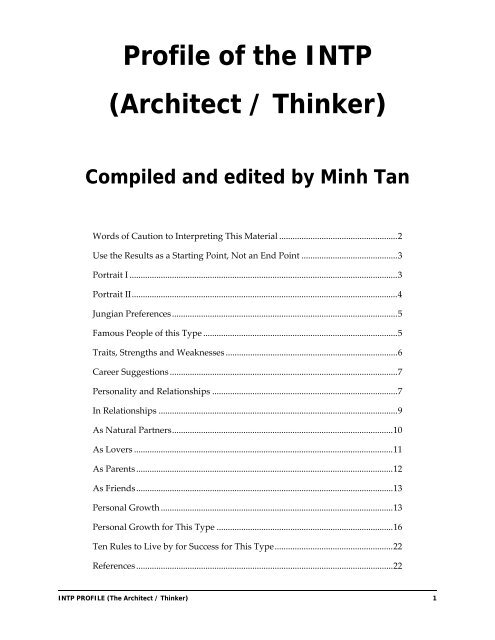
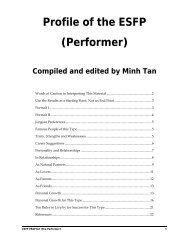
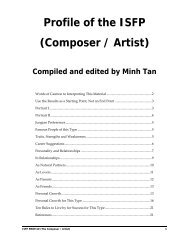
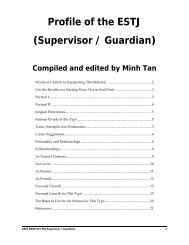
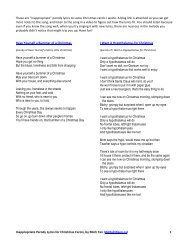
![The Water Is Wide, Traditional [ Capo III in F ] - Digital Citizen](https://img.yumpu.com/36365690/1/190x146/the-water-is-wide-traditional-capo-iii-in-f-digital-citizen.jpg?quality=85)
